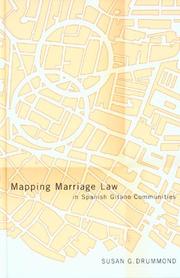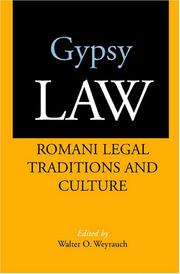| Listing 1 - 2 of 2 |
Sort by
|

ISBN: 9786612740893 0774853832 128274089X 0774809256 9780774809252 9780774809269 0774809264 9780774853835 6612740892 9781282740891 0774809264 Year: 2006 Publisher: Vancouver [B.C.] UBC Press
Abstract | Keywords | Export | Availability | Bookmark
 Loading...
Loading...Choose an application
- Reference Manager
- EndNote
- RefWorks (Direct export to RefWorks)
Comparative law and legal anthropology have traditionally restricted themselves to their own fields of inquiry. Mapping Marriage Law in Spanish Gitano Communities turns this tendency on its head and investigates what happens when the voices of each discipline are invited to speak to each other. Susan Drummond forges this hybrid form of comparative work through small- and large-scale studies of Gitano marriage law as it emerges in a Western European state, in a modern urban centre, and in particular communities and families. Drummond's mapping of Gitano marriage law is grounded in ethnographic fieldwork in Andalucia. The study draws initially from the tradition of comparative law to focus on the emergence of Spanish state family law in a predominantly national and international context. Drummond then adopts the role of legal anthropologist to examine a particular legal culture that exists within, and also beyond, the Spanish state: that of the Gitanos and the transnational Roma. Ultimately, she brings the international, national, and cultural dimensions of law into play with one another and contemplates how all of these influences bear on the spirit of Andalusian Gitano marriage law. The result is an ethos of marriage law in a thoroughly mixed legal jurisdiction. Mapping Marriage Law in Spanish Gitano Communities will appeal to scholars and students in comparative law and legal anthropology, as well as readers interested in Roma studies in general, and the Gitanos in particular.
Marriage law --- Law, Romani. --- Romanies --- Domestic relations --- Law and anthropology. --- Anthropology --- Ethnological jurisprudence --- Bohemians (Romanies) --- Gipsies --- Gitanos --- Gypsies --- Kalderash --- Manush --- Roma (People) --- Romani --- Sinti --- Nomads --- Law, Gypsy --- Romani law --- Romaniya --- Legal status, laws, etc. --- Andalusia (Spain) --- Social life and customs. --- Anthropology and law

ISBN: 1597346454 0520924274 1283646293 9780520924277 0585392455 9780585392455 9780520221857 0520221850 9780520221864 0520221869 9781597346450 Year: 2001 Publisher: Berkeley University of California Press
Abstract | Keywords | Export | Availability | Bookmark
 Loading...
Loading...Choose an application
- Reference Manager
- EndNote
- RefWorks (Direct export to RefWorks)
Approximately one thousand years ago Gypsies, or Roma, left their native India. Today Gypsies can be found in countries throughout the world, their distinct culture still intact in spite of the intense persecution they have endured. This authoritative collection brings together leading Gypsy and non-Gypsy scholars to examine the Romani legal system, an autonomous body of law based on an oral tradition and existing alongside dominant national legal networks. For centuries the Roma have survived by using defensive strategies, especially the absolute exclusion of gadje (non-Gypsies) from their private lives, their values, and information about Romani language and social institutions. Sexuality, gender, and the body are fundamental to Gypsy law, with rules that govern being pure (vujo) or impure (marime). Women play an important role in maintaining legal customs, having the power to sanction and to contaminate, but they are not directly involved in legal proceedings. These essays offer a comparative perspective on Romani legal procedures and identity, including topics such as the United States' criminalization of many aspects of Gypsy law, parallels between Jewish and Gypsy law, and legal distinctions between Romani communities. The contributors raise broad theoretical questions that transcend the specific Gypsy context and offer important insights into understanding oral legal traditions. Together they suggest a theoretical framework for explaining the coexistence of formal and informal law within a single legal system. They also highlight the ethical dilemmas encountered in comparative law research and definitions of "human rights."
Romanies --- Law, Romani. --- Bohemians (Romanies) --- Gipsies --- Gitanos --- Gypsies --- Kalderash --- Manush --- Roma (People) --- Romani --- Sinti --- Nomads --- Law, Gypsy --- Romani law --- Romaniya --- Legal status, laws, etc. --- Law, Romani --- Droit tsigane --- Tsiganes --- Droit --- academic. --- community. --- cultural studies. --- culture. --- gypsies. --- gypsy community. --- india. --- indian. --- language. --- legal issues. --- legal procedures. --- legal system. --- middle east. --- middle eastern. --- minority groups. --- oppression. --- oral tradition. --- persecution. --- roma. --- romani community. --- romani language. --- rules. --- scholarly. --- small communities. --- social history. --- social studies. --- strategy. --- theoretical. --- traditional. --- traditions. --- traveler.
| Listing 1 - 2 of 2 |
Sort by
|

 Search
Search Feedback
Feedback About UniCat
About UniCat  Help
Help News
News